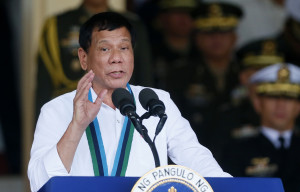The European Union on Monday summoned a Philippine envoy to explain an expletive-laden tirade by President Rodrigo Duterte, who threatened to hang EU officials for opposing his efforts to re-impose the death penalty.
The EU’s external action service, the equivalent of a foreign office, said it hauled Charge d’Affaires Alan Deniega into its Brussels headquarters to provide “an explanation for the recent, unacceptable comments of President Duterte.”
The move highlights growing European exasperation with the president. Earlier, the EU denied his allegations that it proposed solving the Philippines’ drug problem by creating treatment clinics where illegal drugs such as methamphetamine or cocaine would be dispensed.
The EU Delegation to the Philippines issued a statement saying it has not “suggested, discussed, proposed or considered the use of any substitution drugs when treating addiction to methamphetamine … or any other drug addiction in the Philippines.” It did not mention Duterte by name.
Duterte, who has lashed out at the EU repeatedly for raising human rights concerns over his deadly crackdown on illegal drugs, said in a speech Friday the EU had proposed a “health-based solution” to the drug problem that involved dispensing methampetamine, locally known as shabu, cocaine or heroin.
He branded the supposed EU proposal a “government-sponsored idiotic exercise.”
“The sons of bitches, they want us to build clinics, then we should, instead of arresting or putting them in prison like in other countries, you go there and if you want shabu they will inject you or give you shabu,” he said in a speech before Filipino-Chinese businessmen. “Then if you want cocaine, they will give you cocaine and if they want heroin, they will give you heroin.”
The EU said that in cooperation with the World Health Organization and experts, it was working with Manila’s Department of Health and the government’s main anti-drug agency and selected villages to implement a program that “aims to support recovery from addiction, while keeping families together and facilitating development of social and job skills.”
The voluntary program plans to develop “recovery clinics and recovery homes,” where patients can receive better care, education and counseling without prescribing medication and ensuring confidentiality. Livelihood skills will be taught, the EU said.
Thousands have died under Duterte’s crackdown, which was launched after he took office in June, alarming the EU, Western governments and U.N. rights officials.
Duterte has said he will not be intimidated by threats by critics to impeach him or file a case against him before the International Criminal Court for the killings, mostly of poor drug dealers and users. He has denied condoning extrajudicial killings but has repeatedly threatened drug suspects with death and said he is ready to rot in jail to protect Filipinos from atrocious crimes linked to drugs.


